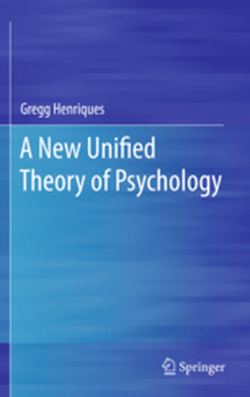A New Unified Theory Of Psychology |
|
|
A New Unified Theory of Psychology introduces a system that addresses psychology’s current theoretical and philosophical difficulties. Pdfs of the book chapters are listed below. The entire book can be purchased at Amazon.com.
Description: Following the demise of the so-called grand theories offered by luminaries like Sigmund Freud, B. F. Skinner, and Carl Rogers, the field of psychology largely gave up its early aspirations to paint a broad picture of the human condition, and now the discipline focuses primarily on empirical problems that have a relatively narrow scope. The consequence has been a proliferation of interesting findings with no real capacity to answer big questions or to generate a shared general understanding of the human condition. This book seeks to change the status quo and offers up a new unified theory of psychology that redefines the science and the profession and paints a new picture of human nature in the process. Praise for A New Unified Theory of Psychology: “The field of psychology is known for its paradoxical combination of sweeping scope and impressive micro-theories, on the one hand, and fragmentation and internecine squabbling, on the other. To this state of affairs, any serious effort to provide integration and unity within psychological knowledge and understanding is heartily welcomed. And Henriques' effort in this regard is not only serious, but one of the most cogent, scholarly, sophisticated, beautifully reasoned, clearly articulated, and accessibly written presentations of a unified theory in psychology that I have seen in my 50 years in the discipline.” Daniel B. Fishman, Author of The Case for Pragmatic Psychology “As the field of psychology has grown, so have the challenges of fragmentation and of misunderstandings. This brave book represents a noble quest to provide a broad, values-based, and scientific framework which holds the power to organize our work and move us forward in strong, new ways.” Lawrence G. Calhoun, Author of Facilitating Post-Traumatic Growth “Concise, erudite, and practical, this book is a manifesto that challenges psychology to move past fragmented domains of knowledge to a consilient framework, which will allow multi-disciplinary discourse and scientific advances. I suggest all scientists, psychotherapists, and scholars spend some time familiarizing themselves with the concepts and suggestions presented in this seminal volume by a leading scholar.” Jeffrey Magnavita, Author of Personality Guided Relational Psychotherapy |


